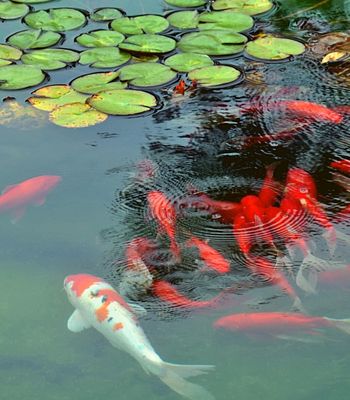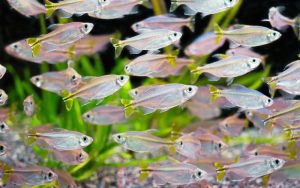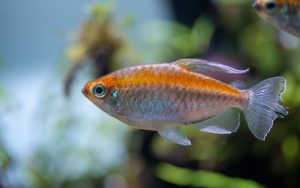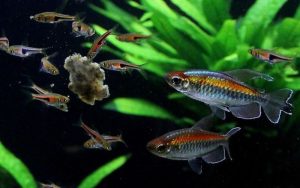Are you tired of battling the persistent green invasion in your beautiful pond? Algae growth can be a real headache for pond owners, but fear not! Nature has its own solution – fish that eat algae in ponds.
Ponds are serene havens for relaxation and a feast for the eyes, but when algae starts taking over, the charm quickly fades away.
In this comprehensive Blog post, we’ll explore ten miracle cleaner fish for pond and discover everything you need to know about the best algae eating fish for ponds.

This article is your ultimate guide to reclaiming your pond’s beauty with the help of natural pond algae eating fish.
We’ll discuss different species of pond fish that eat algae in outdoor ponds, their habits, and how to choose the right ones for your minimum pond size and specific algae problems.
So, let’s jump right into the fascinating world of fish that eat more algae in garden ponds! Say goodbye to string algae and green pond nightmares as we dive into the best pond-friendly algae eaters.
Table of Contents
ToggleAre Pond Fish Enough to Control All Algae?
Pond fish can help to control algae in a pond, but they are not enough to control all algae. There are many different types of algae, and some algae are more difficult for fish to eat than others.
Additionally, fish can only eat so much algae, and if there is a large number of algae in the pond, the fish may be unable to help keep up with it.
Other factors that can affect algae growth in a pond include:
- Nutrient levels: Algae, such as nitrogen and phosphorus, need nutrients to grow. If there are high levels of nutrients in the pond, algae will be more likely to grow.
- Water temperature: Algae grow best in warm water. If the water temperature in your pond is high, you are more likely to have algae problems.
- Sunlight: Algae need sunlight to grow. If your pond is in a sunny location, you are more likely to have algae problems.
It is important to address all of the factors that can contribute to algae growth. To control algae in a pond, This may include:
- Removing excess nutrients from the pond: You can use a skimmer to remove algae and other organic matter from the water’s surface. You might also add plants to the pond, as plants help absorb water nutrients.
- Keeping the water temperature cool: You can do this by shading the pond or adding water features that help to circulate the water.
- Limiting sunlight: You can plant trees or shrubs around the pond.
If you have a large amount of algae in your entire pond, you may need to use a combination of methods to control it. Pond fish can be a helpful part of your significant algae control strategy, but they are not a silver bullet.
Here are some specific tips for using pond fish to control algae:
- Choose the right type of fish. Some fish are more effective algae eaters than others. Some good choices include Siamese algae eaters, plecostomus, and pond loaches.
- Add enough fish. The number of fish you need to add to your garden pond will depend on the pond size and the amount of algae you have. A good rule of thumb is to add one algae-eating fish for every 10 square feet of pond surface area.
- Feed your fish properly. Overfeeding your fish can contribute to algae growth. Feed your fish high-quality food and only as much as they can in a few minutes.
- Monitor your pond regularly. Check your pond for algae growth and adjust your algae control strategy.
10 Best Fish That Eat Algae in Ponds: (List of 6 Algae Eating Fish for Ponds)
Here are ten of the best fish that control algae in a pond and home aquarium:
1. Koi: The Majestic Algae Warriors
Koi fish, known for their energetic colors and graceful movements, also play a crucial role in maintaining a healthy pond. These larger fish are voracious eaters of various types of algae, including string algae and green pond scum. Their beauty and functionality make them a top choice for pond owners.
2. Pleco: Nature’s Algae Vacuum
Plecos, or plecostomus fish, are renowned for their algae-eating abilities. These bottom-dwellers tirelessly scour your pond floor, gobbling up algae and keeping your pond clean. They are excellent companions for Koi and goldfish, creating a harmonious aquatic ecosystem.
3. Siamese Algae Eater: The Tiny Algae Assassin
Siamese algae eaters for ponds may be small, but they are big on appetite for algae. These little helpers are ideal for smaller fish ponds and are known to control algae growth effectively.
4. Chinese High-Fin Banded Shark: The Unconventional Pond Cleaner Fish
Despite their name, Chinese high-fin banded sharks are not sharks at all. These unique fish are often mistaken for plants due to their appearance, making them a discreet choice for algae control. They thrive in larger ponds and offer a different approach to maintaining your pond’s cleanliness.
5. Japanese Trapdoor Snails: Nature’s Cleanup Crew
While not fish, Japanese trapdoor snails are worth mentioning for their remarkable heavily on algae eating abilities. These snails are a fantastic addition to your pond’s ecosystem and can help combat algae, especially in smaller ponds.
6. Goldfish: Not Just for Your Aquarium
Goldfish, like Koi, are aesthetically pleasing and beneficial for your pond. They enjoy feasting on various types of algae and contribute to maintaining a balanced aquatic environment.
7. Bottom Feeders: The Algae Eradicators
Bottom-feeding fish, such as catfish and loaches, are excellent at keeping your pond floor clean. They root out algae and detritus, preventing it from accumulating and affecting water quality. However, Channel Catfish occupy a slightly higher position in the food chain than smaller, less aggressive fish.
These resilient creatures tend to consume other fish in the pond, including Koi fish. Therefore, it is advisable not to acquire these fish for your pond if other fish cohabit within it due to their inclination to eat other fish.
8. Nualgi Ponds: The Natural Solution
Nualgi Ponds is a unique product that promotes the growth of diatoms, which outcompete algae for nutrients. While not a fish, it’s a natural solution that can eat a lot of algae in your pond.
9. Red Algae-Eating Fish: Targeting Specific Algae
Red algae can be particularly stubborn, but certain fish species, like the Mollies, specialize in consuming red algae. Adding them to your pond can help combat this specific type of algae.
10. Large Pond Dwellers: Tackling Big Algae Problems
Consider adding larger fish like grass carp for larger ponds with extensive algae problems. These giants are experts at controlling the algae population in substantial bodies of water garden.
Choosing the Right Fish for Your Pond
Before introducing algae-eating fish to your pond, consider the following factors:
- Pond Size: Larger ponds can accommodate more hardy fish and larger species.
- Types of Algae: Identify the specific algae types in your pond to select the most suitable pond algae eating fish.
- Compatibility: Ensure the fish you choose get along well with other pond inhabitants.
- Water Temperatures: Some fish prefer warmer waters, so match them to your region’s climate.
- Fish Behavior: Take note of whether the fish also eat soft or filamentous algae.
Methods of Pond Algae Control
In addition to introducing algae-eating fish, you can employ various methods to control algae growth in your pond:
- Regular Maintenance: Routine cleaning and debris removal can prevent excess algae from forming.
- Use of Pond Liner: Installing a pond liner can help control water quality and prevent algae buildup.
- Proper Pond Filtration: Invest in a high-quality filtration system to remove excess nutrients that promote algae growth.
- Balanced Feeding: Don’t overfeed your fish, as uneaten food can contribute to nutrient imbalances in the pond.
- Shade and Aquatic Plants: Provide shade with water lilies or floating pond plants to reduce sunlight penetration, which limits algae growth.
- Chemical Treatments: Consider using algaecides as a last resort, but use them sparingly and as directed to avoid harming your pond’s ecosystem.
You can achieve a harmonious and algae-free aquatic environment by incorporating these methods and carefully selecting the right algae-eating fish for your pond.
Remember, maintaining a pond is an ongoing process, and with the right knowledge and tools, you can enjoy a vibrant and thriving water feature for years to come.
What is Bad Algae vs. Good Algae?
Bad pond algae are any algae that is excessive or harmful to the pond ecosystem. Consider what type of algae can include:
- Blue-green algae (cyanobacteria): Blue-green algae is the most common type of harmful algae in ponds. It might produce toxins that can harm fish, humans, and animals. Blue green algae blooms can also deplete water oxygen levels, causing fish kills.
- Filamentous algae: Filamentous algae is a type of algae that forms long, stringy mats on the surface of the water or the bottom of the pond. It can be unsightly and interfere with swimming, fishing, and other recreational activities. Filamentous algae can also block sunlight from reaching other aquatic plants, reducing the diversity of the pond ecosystem.
- Algae blooms: Algae blooms can occur when there is an excess of nutrients in the water. This can be caused by runoff from fertilizers, sewage, or other sources. Algae blooms might deplete oxygen levels in the water and can also produce toxins.
Good pond algae is any algae that is beneficial to the pond ecosystem. This can include:
- Planktonic algae: Planktonic algae is a type of algae that floats freely in the water column. It is a food source for zooplankton, which fish and other aquatic animals eat. Planktonic algae is essential for the health of the pond food chain.
- Floating aquatic plants: Floating aquatic plants provide shade for fish and other aquatic animals. They also help to filter the water and reduce the growth of algae.
- Benthic algae: Benthic algae is a type of pond algae that grows on the bottom of the pond. It helps to stabilize the sediment and provides a habitat for aquatic invertebrates.
Here are some of the key differences between good and bad pond algae:
| Characteristic | Good algae | Bad algae |
|---|---|---|
| Appearance | Usually small and inconspicuous | Can be large and unsightly, or form thick mats |
| Impact on the ecosystem | Beneficial, providing food and habitat for other aquatic organisms | Harmful, can deplete oxygen levels, produce toxins, and interfere with recreational activities |
If you have a small pond, it is important to manage the algae levels to ensure that the pond ecosystem is healthy. This can be done by reducing nutrient inputs to the pond, controlling the growth of algae blooms, and planting beneficial aquatic plants.
Commonly Asked Questions about Pond Algae Eaters (FAQs)
What types of fish eat algae in Koi ponds?
Some common types of pond fish that eat algae in koi ponds include pond loach, koi, Siamese algae eater, pleco, chinese high-fin banded shark, and snail.
What is the purpose of having fish that eat algae in a pond?
The purpose of having fish that eat algae in a pond is to help control and prevent algae overgrowth. These fish consume algae as their primary food source, keeping the pond’s ecosystem balanced.
Do all types of fish eat algae in ponds?
No, not all types of fish eat algae in ponds. While many fish species consume algae as part of their diet, some species do not prefer to eat algae or rely on other food sources.
Can fish that eat algae coexist with other fish in the pond?
Yes, fish that eat algae can coexist with other fish in the pond. However, it’s important to consider the temperament and size of the fish to ensure they are compatible. Some fish may eat smaller fish or exhibit aggressive behavior towards other species.
How many fish do I need to help control algae in my pond?
The number of fish needed to help control algae in a pond depends on the size of the pond and the amount of algae present. It is recommended to have a suitable number of algae-eating fish for the specific pond size and algae problem.
What is the best type of fish to help control algae in a pond?
The best type of fish to help control algae in a pond may vary depending on the specific circumstances. Some commonly recommended pond algae eaters are pond loach, Siamese algae eater, pleco, and Japanese trapdoor snails. It’s important to consider the size and compatibility of the fish with other pond inhabitants.
Can Koi fish eat algae in a pond?
Yes, koi fish are known to consume algae as part of their diet. They can help control algae in the pond, particularly when provided with a balanced diet and suitable pond conditions.
Can fish that eat algae survive in a small pond?
Some fish that eat algae can survive in a small pond, depending on the specific fish species and the size and quality of the pond. However, it’s important to ensure that the small size pond can accommodate the needs of the fish in terms of space, water quality, and access to suitable food sources.
How much algae can fish consume in a day?
The amount of algae fish can consume in a day might vary depending on factors such as the size of the fish, the amount of algae available, and the overall pond water conditions. However, fish that eat algae can contribute significantly to reducing algae in the pond by consuming it as part of their natural diet.
Can fish that eat algae survive in a winter pond?
Fish that will eat algae in a pond may need to be transferred indoors for the winter to ensure their survival. Some fish species are not adaptable to cold temperatures and may require a pond heater or suitable indoor environment to survive during winter.
What fish keep a pond clean?
Fish that clean ponds include koi, goldfish, and certain catfish species like channel catfish. They help maintain water clarity by consuming algae and debris, contributing to a cleaner pond environment.
Conclusion
In conclusion, maintaining a healthy and vibrant pond ecosystem is essential for its overall well-being. By incorporating a variety of aquatic plants, proper filtration systems, and regular maintenance, you can create an environment that thrives. One crucial element to consider is introducing fish that also eat algae in ponds. These natural algae-eaters are vital in keeping the pond water clear and balanced. From the graceful koi to the diligent plecos, these fish add beauty to your pond and contribute to its cleanliness. So, remember to choose the best fish that eat algae in ponds to ensure a flourishing aquatic paradise.
You might also like
- What Do Guppies Eat in the Wild: (A Comprehensive Guide)
- Does Goldfish Eat Algae? (5 Best Pond Algae Eaters)
- Do Cherry Shrimp Eat Algae Effectively: The Shocking Truth!
- Do Guppies Eat Algae: A Comprehensive Guide You’ll Ever Need!
- Do Cory Catfish Eat Algae: Unveiling the Top 10 Algae-Eaters
- What Algae Eaters Can Live with Goldfish? (5 Best Tankmates)
- Are Cory Catfish Good Cleaners: (Find Out Now!)
- Top 10 Self Cleaning Fish Tank: (No One Tells You!)
- Siamese Algae Eater Fish 101: Ultimate Care Guide for Beginners!




